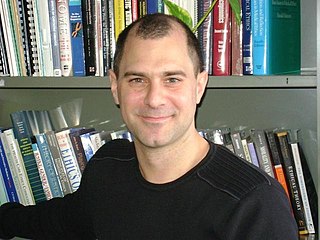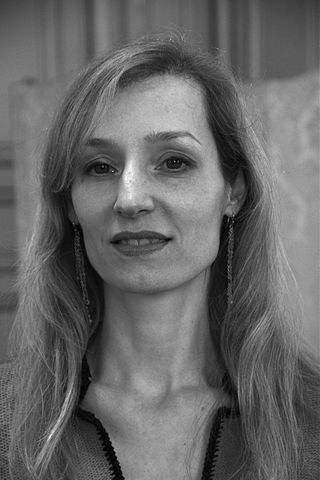
The Université de Sherbrooke is a French-language public research university in Sherbrooke, Quebec, Canada, with a second campus in Longueuil, a suburb on the South Shore of Montreal. It is one of two universities in the Estrie region of Quebec, and the only French-language university for the region.

Bartha Maria Knoppers, OC OQ is a Canadian law Professor and an expert on the ethical aspects of genetics, genomics and biotechnology.
Gilbert Hottois was a Belgian professor of philosophy at the Université Libre de Bruxelles who specialised in Bioethics.

The Jean Moulin University Lyon 3, also referred to as Lyon 3, is one of the three public universities of Lyon, France. It is named after the French Resistance fighter Jean Moulin and specialises in Law, Politics, Philosophy, Management and languages.
Expenditures by Canadian universities on scientific research and development accounted for about 40% of all spending on scientific research and development in Canada in 2006.
The International Bioethics Committee (IBC) of UNESCO is a body composed of 36 independent experts from all regions and different disciplines that follows progress in the life sciences and its applications in order to ensure respect for human dignity and human rights. It was created in 1993 by Dr Federico Mayor Zaragoza, General Director of UNESCO at that time. It has been prominent in developing Declarations with regard to norms of bioethics that are regarded as soft law but are nonetheless influential in shaping the deliberations, for example, of research ethics committees and health policy.

Dominique Lecourt was a French philosopher. He is known in the Anglophone world primarily for his work developing a materialist interpretation of the philosophy of science of Gaston Bachelard.

The National Core for Neuroethics at the University of British Columbia was established in August 2007, with support from the Canadian Institutes of Health Research, the Institute of Mental Health and Addiction, the Canada Foundation for Innovation, the British Columbia Knowledge Development Fund, the Canada Research Chairs program, the UBC Brain Research Centre and the UBC Institute of Mental Health. Co-founded by Judy Illes and Peter Reiner, the Core studies neuroethics, with particular focus on ethics in neurodegenerative disease and regenerative medicine, international and cross-cultural challenges in brain research, neuroimaging and ethics, the neuroethics of enhancement, and personalized medicine.
Clinical ethics support services initially developed in the United States of America, following court cases such as the Karen Ann Quinlan case, which stressed the need for mechanisms to resolve ethical disputes within health care. The Joint Commission on Accreditation of Healthcare Organizations requirement for hospitals, nursing homes, and home care agencies to have a standing mechanism to address ethical issues has also fostered this development.
The Neuroethics Research Unit was created in 2006, at the Institut de recherches cliniques de Montréal (IRCM), which is affiliated to the Université de Montréal. The Unit is one of the pioneer units in Canada in this area of research. Neuroethics is a new area of research where bioethics and neuroscience intersect. The focus is on ethical considerations in neuroscience research and the many ethical issues that arise from the transfer of neuroscience to health care.

Françoise Elvina BaylisFISC is a Canadian bioethicist whose work is at the intersection of applied ethics, health policy, and practice. The focus of her research is on issues of women's health and assisted reproductive technologies, but her research and publication record also extend to such topics as research involving humans, gene editing, novel genetic technologies, public health, the role of bioethics consultants, and neuroethics. Baylis' interest in the impact of bioethics on health and public policy as well as her commitment to citizen engagement]and participatory democracy sees her engage with print, radio, television, and other online publications.

Bryn Williams-Jones is a Canadian bioethicist, professor and director of the Department of Social and Preventive Medicine at the School of Public Health, Université de Montréal. He is co-founder and editor-in-chief of the Canadian Journal of Bioethics/Revue canadienne de bioéthique, the first open access bilingual bioethics journal in Canada, and co-director of the Ethics branch of the International Observatory on the Social Impact of AI and Digital Technology (OBVIA). Williams-Jones is a member of the Centre for Research in Public Health (CReSP), the Centre for Ethics Research (CRÉ), the Institute for Applied Ethics (IDÉA) of the Université Laval, and fellow of The Hastings Center.

Anne Fagot-Largeault, born on September 22, 1938, in the 10th arrondissement of Paris, is a French philosopher, honorary professor at the Collège de France, psychiatrist at the Assistance publique - Hôpitaux de Paris, and a member of the French Academy of sciences since 2002.

Roland Tomb is a Lebanese-French author, bioethicist and dermatologist born in 1958 in Beirut, Lebanon. He has been holding office as the Dean of the Faculty of Medicine at Beirut's Saint Joseph University since 2011. He is the chairperson of the Department of Bioethics at this same university, and is an active member of UNESCO's committees concerned with bioethics.

Valéry Giroux is a Canadian philosopher, lawyer and animal rights activist from Quebec. She is an adjunct professor at the Université de Montréal Faculty of Law, associate director for the Centre de recherche en éthique, a Fellow of the Oxford Centre for Animal Ethics, and an author and speaker on animal ethics issues and veganism, with a notable focus on the topic of antispeciesism through her co-editorship of the antispeciesist journal L'Amorce. Her philosophy argues for the equal moral consideration of all sentient beings, objects to the ethical notion that the utilization of non-human animals by humans as being morally permissible, and advocates for the individual right to freedom for all sentient beings, regardless of their species, emphasizing negative or republican freedom over positive freedom.

Eric Racine FCAHS, is the Director of the Pragmatic Health Ethics Research Unit based at the Montreal Clinical Research Institute, a research professor at the Université de Montréal and the Montreal Clinical Research Institute, and an adjunct professor in the Department of Neurology and Neurosurgery at McGill University.

Corine Pelluchon is a French philosopher and professor of philosophy at the University of Paris-Est Marne-la-Vallée (UPEM).











